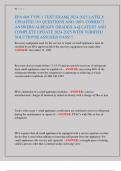Exam (elaborations)
EPA 608 TYPE 1 TEST EXAM|| LATELY UPDATED 210 QUESTIONS AND 100% CORRECT ANSWERS ALREADY GRADED A+|| LATEST AND COMPLETE UPDATE WITH VERIFIED SOLUTIONS|| ASSURED PASS!!!
- Course
- Institution
EPA 608 TYPE 1 TEST EXAM|| LATELY UPDATED 210 QUESTIONS AND 100% CORRECT ANSWERS ALREADY GRADED A+|| LATEST AND COMPLETE UPDATE WITH VERIFIED SOLUTIONS|| ASSURED PASS!!!
[Show more]



